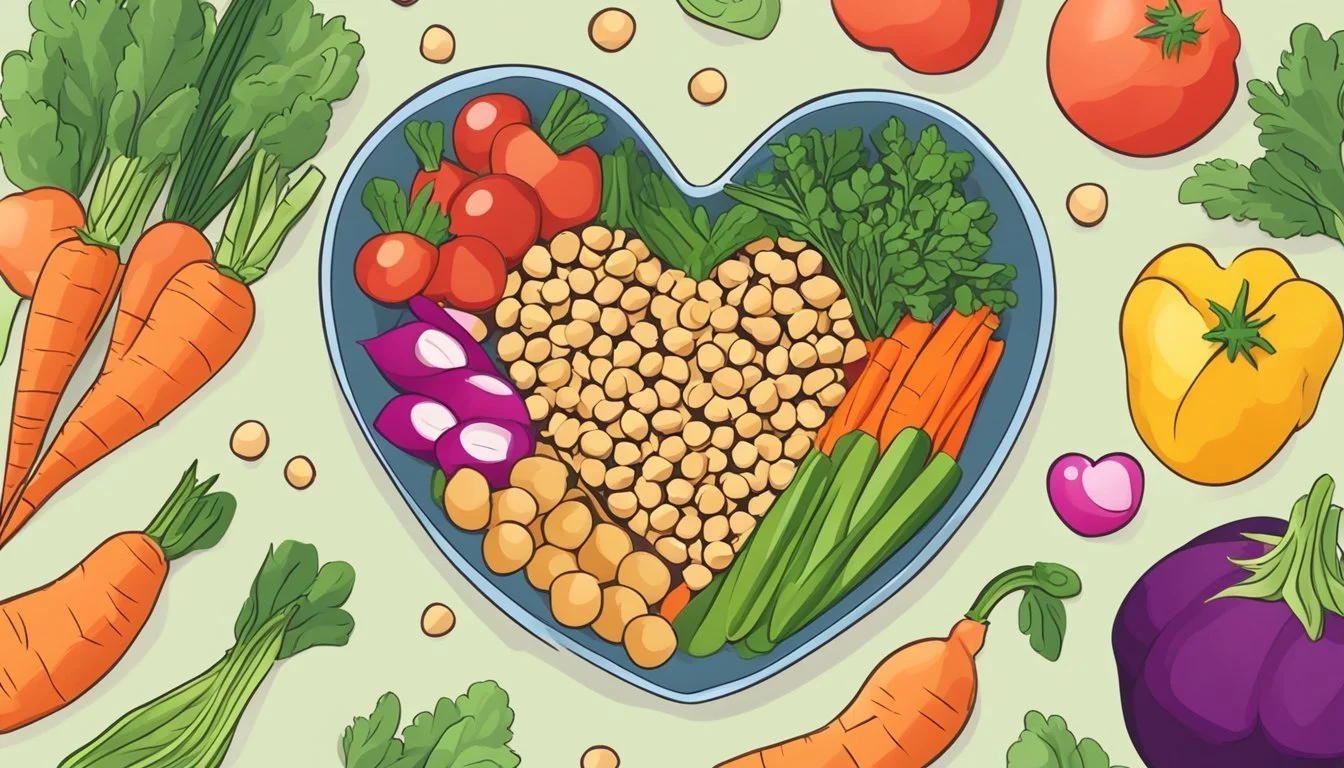What Are the Health Benefits of Chickpeas?
Unveiling Nutritional Perks
Chickpeas, also known as garbanzo beans, are a highly nutritious legume that have been consumed for thousands of years. They are renowned for their versatility in various cuisines and their ability to provide a substantial source of plant-based protein. Packed with a range of essential vitamins and minerals, chickpeas offer numerous health benefits, making them a valuable addition to any diet.
Rich in dietary fiber, chickpeas contribute to better digestive health and have been associated with a lower risk of several chronic diseases. The fiber content helps regulate blood sugar levels, making chickpeas a great food for managing diabetes. They are also abundant in key nutrients such as folate, manganese, and iron, supporting overall health and well-being.
Incorporating chickpeas into meals can support heart health due to their combination of fiber, potassium, and vitamins. The legume's protein and fiber synergy can help with weight management by promoting a feeling of fullness, reducing the likelihood of overeating. Through regular consumption, chickpeas can play a role in sustaining a balanced diet and contributing to a healthy lifestyle.
Nutritional Profile of Chickpeas
Chickpeas, also known as garbanzo beans, are a nutrient-dense legume. They provide an impressive profile of vitamins and minerals, alongside essential macronutrients that contribute to overall health.
Vitamins and Minerals
Chickpeas are an excellent source of several important vitamins and minerals. Here's a focused breakdown of their contents:
Folate (Vitamin B9): Essential for healthy pregnancy and prevention of neural tube defects; chickpeas contribute significantly to the daily value (DV).
Iron: Important for preventing anemia; a cup of chickpeas contains a substantial portion of the DV.
Magnesium: Crucial for muscle and nerve function as well as maintaining a healthy immune system.
Potassium: Supports heart health by helping to maintain normal blood pressure levels.
Calcium: While not in high quantities, chickpeas still contribute to bone health.
Zinc: Essential for immune function and DNA synthesis.
Phosphorus: Important for bone health and maintaining various bodily functions.
Selenium: Has antioxidant properties and is important for hormonal health.
Manganese: High in chickpeas, it plays a role in bone development and wound healing.
Vitamins A, C, E: Present in varying amounts, these vitamins act as antioxidants and support immune function.
Macronutrients
Chickpeas are known for their rich macronutrient content, especially in terms of protein and fiber:
Protein: They are a good source of plant-based protein, important for muscle tissue building and repair.
Dietary Fiber: High in both soluble and insoluble fiber, chickpeas support digestive health and can aid in maintaining healthy blood sugar levels.
Carbohydrates: The primary energy source in chickpeas, with a low glycemic index beneficial for blood sugar control.
Fat: Contain modest amounts of fat, including some beneficial polyunsaturated fatty acids.
Sugar: Chickpeas possess minimal sugar content, making them a healthy choice for maintaining stable energy levels.
Health Benefits of Chickpeas
Chickpeas offer a range of health advantages, from supporting heart health to managing blood sugar levels. They are a nutrient-dense legume high in fiber and protein, essential for overall well-being.
Cardiovascular Health
Chickpeas are beneficial for heart health due to their high fiber content, which can help lower cholesterol levels. They also contain potassium, which aids in blood pressure regulation, and magnesium, which is vital for maintaining a healthy heartbeat.
Blood Sugar and Diabetes Management
Legumes like chickpeas have a low glycemic index, which means they have a minimal impact on blood sugar levels. This makes them an excellent dietary choice for managing diabetes and maintaining stable blood glucose levels.
Digestive Health and Weight Management
The fiber in chickpeas promotes healthy digestion, assists in regular bowel movements, and can prevent constipation. Fiber also contributes to feelings of satiety and fullness, which can aid in weight management by reducing overall calorie intake.
Cancer Prevention and Mental Health
Chickpeas contain antioxidants, which may reduce the risk of certain types of cancer by combating oxidative stress in the body. They also offer nutrients like choline for mental health, which supports brain function and may have implications for preventing cognitive decline.
Culinary Uses of Chickpeas
Chickpeas, also known as garbanzo beans, are versatile legumes that have made their mark in various cuisines around the world. Their ability to absorb flavors and provide a satisfying texture makes them an essential ingredient in many dishes.
Cooking with Chickpeas
Chickpeas can be cooked and used in a multitude of ways. Dried chickpeas require soaking, usually overnight, and a longer cooking time, but yield a firmer texture that's ideal for salads and stews. Canned chickpeas are convenient and ready to use, making them a time-saving option for soups, stews, and quick recipes.
One of the most beloved preparations of chickpeas is hummus, a creamy spread where cooked chickpeas are blended with tahini, olive oil, lemon juice, and garlic. Chickpeas also form the base for falafel, a deep-fried ball or patty that's seasoned and commonly served in pita bread.
As an egg substitute in baking, aquafaba—the liquid from cooked chickpeas—has gained popularity. It whips up like egg whites, making it suitable for vegan recipes. Furthermore, chickpea flour is used for gluten-free baking and to create batters for dishes like pancakes and flatbreads.
Types of Chickpeas
There are multiple varieties of chickpeas. The most common type found in grocery stores is the beige-colored Kabuli, characterized by its large, round shape. It's commonly used in Mediterranean and Middle Eastern cuisines. The Desi variety, which is smaller and darker, often appears in Indian and Pakistani dishes.
Both varieties are rich in protein and fiber, making them a healthful addition to any meal. Whether incorporated into a rustic Italian minestrone, a spicy Indian chana masala, or used as a salad topping, chickpeas enhance the flavor and nutritional profile of countless recipes.
Frequently Asked Questions
Chickpeas are a nutrient-dense food offering various health benefits. This section addresses specific queries related to the health implications of incorporating chickpeas into one's diet.
How can consuming chickpeas benefit women's health specifically?
For women, chickpeas provide significant amounts of iron, which is crucial in preventing anemia, especially for those of childbearing age. The high folate content in chickpeas is also beneficial for pregnant women, aiding in fetal development.
What potential side effects should one be aware of when eating chickpeas?
While chickpeas are generally safe for consumption, they can cause gastrointestinal issues such as bloating and gas due to their high fiber content. Individuals with a G6PD deficiency should avoid chickpeas because they can trigger hemolysis in these individuals.
In what ways do chickpeas contribute to men's health?
Chickpeas support men's health by providing essential nutrients like zinc, which is pivotal for testosterone production and reproductive health. Their protein content also aids in muscle development and maintenance.
Can eating chickpeas contribute to weight gain?
Chickpeas are low in calories and high in fiber and protein, making them an excellent food for weight management. Their satiating effect can contribute to reduced calorie intake and potentially aid in weight loss rather than gain.
What are the skin health benefits associated with chickpeas?
Chickpeas contain manganese, which protects skin cells from oxidative stress, helping maintain skin health. They also have B vitamins that assist in cell regeneration, contributing to a clearer and healthier skin complexion.
How does the nutritional profile of chickpeas impact overall health?
The nutritional content of chickpeas, including fiber, protein, vitamins, and minerals like manganese and folate, contribute to heart health, blood sugar control, and improved digestion, supporting overall health and well-being.



